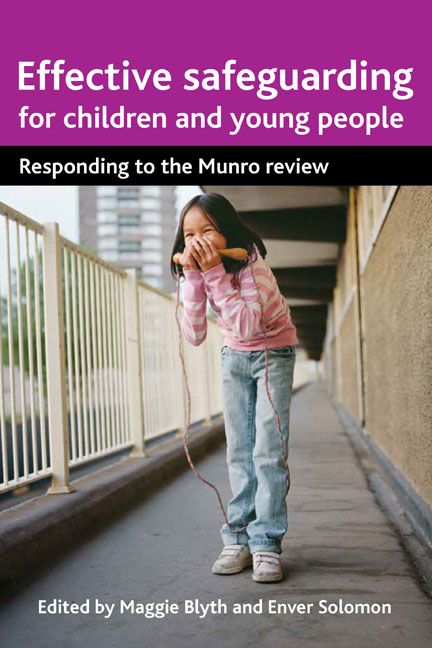Book contents
- Frontmatter
- Contents
- List of abbreviations
- Notes on contributors
- Acknowledgements
- Foreword
- one Early intervention
- two Local safeguarding children boards: faith, hope and evidence
- three The child's voice in the child protection system
- four Parental mental health, risk and child protection: what does Munro mean to child protection and adult mental health?
- five Adolescent-to-parent abuse and frontline service responses: does Munro matter?
- six Older children and the child protection system
- seven Serious case review
- Index
four - Parental mental health, risk and child protection: what does Munro mean to child protection and adult mental health?
Published online by Cambridge University Press: 07 September 2022
- Frontmatter
- Contents
- List of abbreviations
- Notes on contributors
- Acknowledgements
- Foreword
- one Early intervention
- two Local safeguarding children boards: faith, hope and evidence
- three The child's voice in the child protection system
- four Parental mental health, risk and child protection: what does Munro mean to child protection and adult mental health?
- five Adolescent-to-parent abuse and frontline service responses: does Munro matter?
- six Older children and the child protection system
- seven Serious case review
- Index
Summary
Introduction
Parents with mental health problems can present particular difficulties for health and social care services concerned with child health, child protection and adult mental health. Many children living with parents with mental illness suffer no harm and young carers may even find benefits in the relationship. However, potential harm to children may be immediate and life-threatening, particularly if the child features in the parent's delusional or suicidal ideas. This chapter explores what we know about children who suffer a negative developmental impact from mentally ill parents and is supported by data from studies of serious case reviews (SCRs) undertaken across England and Wales in recent years (Coombe, 2010). It demonstrates the importance of close collaboration between adult mental health practitioners and those working in the child protection system. The conclusion is stark. What levers do the changes currently espoused by the Munro Review (Munro, 2011) and the government response (DfE, 2011) bring to such a liaison? And what should policymakers and strategic managers expect of practitioners in primary and secondary health services who interface with the child protection system around accountability and management of risk?
This chapter concludes that, when it comes to professional decisionmaking and assessment of risk, professionals continue to focus on the individual who is the remit of their services rather than the family. In this case, how can Munro have the impact needed on multi-agency working and how will current changes to health commissioning and service delivery help the child's journey? Conflicts of interest already occur between child-focused and adult-focused services as a result of working to different agendas, legislation and guidance and it is not clear whether the broad-brush changes put forward by Munro will have the required impact.
In the White Paper Equity and excellence: Liberating the NHS (DH, 2010), there are clear references to the roles and responsibilities of GP consortia (subsequently renamed clinical commissioning groups) and health and wellbeing boards in safeguarding. Since then, consultation documents and papers related to NHS reforms have continued to reinforce the statutory requirements relating to child protection, culminating in the government response to the NHS future forums report:
The NHS and other health organisations have a critical role in preventing and identifying abuse, neglect and exploitation of vulnerable adults and children, and we will ensure that the leaders of all health organisations recognise and fulfil their safeguarding responsibilities.
- Type
- Chapter
- Information
- Effective Safeguarding for Children and Young PeopleWhat Next after Munro?, pp. 69 - 90Publisher: Bristol University PressPrint publication year: 2012



